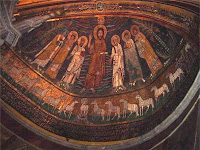Venerated as the patron saint of musicians, St. Cecilia is one of those many Romans who held steadfast to the faith in the persecutions against the Roman Church during its early years. She was a Roman maiden engaged to be married to a pagan named Valerian. After their marriage, she brought him to Pope Urban I. Santa Cecilia in Trastevere. Through prayers and good example, Saint Cecilia
converted her husband, St. Valerian, and her brother-in-law, St. Tiburtius, to
Christianity. As a result, all three were condemned to death (230). They tried
unsuccessfully to suffocate St. Cecilia in her own bath by steaming her alive.
Witnesses heard her singing songs to God throughout the ordeal (that is why she
is the patron saint of music). They then tried to behead her. By Roman law,
the executioner only had three attempts to severe the head.
The executioner, unsuccessful, ran away leaving her to slowly bleed to death.
During the next few days, many were converted by her preaching. She died in a
pool of her own blood, her fingers outstretched to proclaim her faith in the
Triune God.
The bodies of this holy family were transferred to this church in 821 by Pope
Paschal I (817-824). (See the mosaic depicting Paschal (with square nibus)
giving the church to St. Cecilia who introduces him to St. Paul. Jesus in the
center and next to him is Ss. Peter, Valerian, and Agatha. Below are the 12
lambs approaching Christ the Lamb of God from Bethlehem and Jerusalem.) In 1599,
her tomb was opened and her body was found to be incorruptible. The sculptor
Moderno was there, drew what he saw, and later made the famed statue (see
photo). It' is located below the main altar.



No comments:
Post a Comment